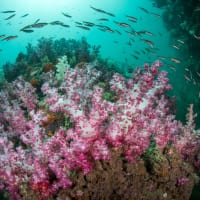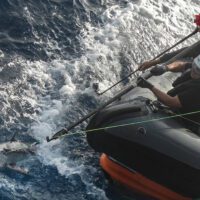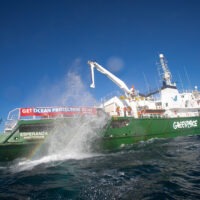Overfishing is emptying the seas
As traditional species disappear, other species are targeted and even renamed to make them more appealing. For instance, the Patagonian toothfish was reinvented as the more appetisingly named Chilean seabass. Fleets are also venturing into more distant waters in the Arctic and Antarctic oceans to ravage fish populations there.
Fishing methods used by these ships are often very destructive. Bottom and beam trawling drag nets across the seabed to catch flat fish like hake and sole. But they also smash everything in their way, destroying fragile coral reefs. And most fishing methods are very indiscriminate, catching many other species by accident. This ‘bycatch’ includes turtles, sharks, dolphins and other fish, which are often thrown back dead or dying into the sea.
There’s a human cost too. Industrial fishing means small-scale fishers using more traditional methods are suffering. In the UK, smaller boats are finding it hard to make enough money and communities in many fishing ports are economically deprived. The number of fishers has also halved in the last 20 years. Elsewhere in the world, people who depend on fish for food and income are seeing their stocks disappear as foreign vessels trawl in their waters.
Unfair fishing quotas
The way the UK government allocates fishing quotas plays a big part in this. Quotas have become concentrated in the hands of a small number of multi-million pound companies. Just five families control nearly a third of UK fishing quotas and more than two thirds of fishing quota is controlled by just 25 companies. Compared to smaller fishing operations, these big companies employ fewer people, use less sustainable fishing methods and less money makes its way into local economies.
Our government already has the power to change the way it distributes quotas. Greenpeace is campaigning for a fairer allocation system that favours local, sustainable fishing which will help create jobs and allow fish stocks to recover.
We’re also taking on the corporate giants plundering our oceans. Thai Union, the biggest tuna company in the world and owner of John West, was turning a blind eye to appalling conditions for workers and destructive fishing practices. But then an outcry from thousands of people around the world forced Thai Union to clean up its operations.
And we need to create more protected areas at sea. A network of ocean sanctuaries will provide refuges for fish and other marine life to thrive away from the threat of industrial fishing fleets. With climate change creating other threats to our oceans, we need to give them all the help we can.




